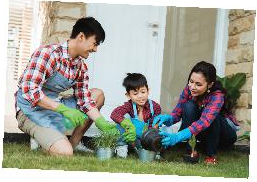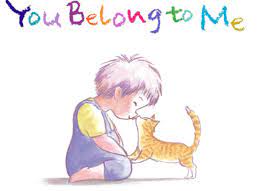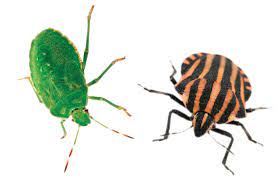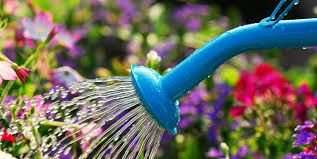Bài 1
Reading
1. Work in pairs. Look at the picture and discuss the questions below.
(Làm việc theo nhóm. Nhìn vào bức tranh và thảo luận câu hỏi bên dưới.)
1. What can you see in the picture?
(Bạn có thể nhìn thấy gì trong bức tranh?)
2. In your opinion, what is good about gardening?
(Theo ý kiến của bạn, làm vườn có gì tốt?)


1. In the picture, I can see 3 people. Maybe It’s a family. They are gardening together. There are a lot of plants around.
(Trong ảnh, tôi có thể nhìn thấy 3 người. Có lẽ đó là một gia đình. Họ đang làm vườn cùng nhau. Xung quanh có rất nhiều cây cỏ.)
2. In my opinion, gardening is very good. Gardening can connect family members. It also helps people protect our environment. Gardening can help us to have clean food to eat.
(Theo tôi, làm vườn là rất tốt. Làm vườn có thể kết nối các thành viên trong gia đình. Nó cũng giúp mọi người bảo vệ môi trường của chúng ta. Làm vườn có thể giúp chúng ta có thực phẩm sạch để ăn.)
Bài 2
2. Read the text about gardening. Match each word in column A with its definition in column B.
(Đọc đoạn văn về làm vườn. Nối mỗi từ ở cột A với định nghĩa của nó ở cột B.)
People divide hobbies into four big groups: doing things, making things, collecting things, and learning things. Gardening belongs to the most popular group - doing things.
Gardening is one of the oldest outdoor activities. It has something for everyone, even for chỉldren. Gardening teaches children about flowers, fruits, and vegetables. They can also learn about insects and bugs. When gardening, children learn to be patient and take on responsibility. They learn to wait for the plants to grow to maturity And if they don’t water their plants, their plants will die. This teaches them valuable lessons about responsibility.
Gardening is also good because everyone in the family can join in and do something together. My mum and I love gardening. We usually spend an hour a day in our garden. It really makes us happy, and we love spending time together.
|
A |
B |
|
1. outdoor |
a. a very developed from |
|
2. patient |
b. happening outside |
|
3. responsibility |
c. the duty of taking care of something |
|
4. maturity |
d. very helpful |
|
5. valuable |
e. able to wait for a long time |

- outdoor (adj): ngoài trời
- patient (adj): kiên nhẫn
- responsibility (n): trách nhiệm
- maturity (n): sự trưởng thành
- valuable (adj): có giá trị, có ích

|
1 - b |
2 - e |
3 - c |
4 - a |
5 - d |
1 - b. outdoor = happening outside
(ngoài trời = diễn ra ở bên ngoài)
2 - e. patient = able to wait for a long time.
(kiên nhẫn = có thể chờ đợi trong một thời gian dài)
3 - c. responsibility = the duty of taking care of something
(trách nhiệm = nhiệm vụ chăm sóc một cái gì đó)
4 - a. maturity = a very developed from
(sự trưởng thành = rất phát triển)
5 - d. valuable = very helpful
(có giá trị = rất có ích)
Bài 3
3. Read the text again. Complete each sentence with no more than THREE words.
(Đọc lại đoạn văn. Hoàn thành mỗi câu sau với không quá 3 từ.)
1. Gardening belongs to the group of ____________.
2. Gardening teaches children about flowers, fruits, vegetables,___________.
3. Gardening makes children become ____________ and responsible.
4. It is an activity that everyone in the family can ____________.
5. The author and her mother usually garden for _______ a day.

|
1. doing things |
2. insects and bugs |
3. patient |
4. join in |
5. an hour/ one hour |
1. Gardening belongs to the group of doing things.
(Làm vườn thuộc nhóm làm việc gì đó.)
Thông tin: ... Gardening belongs to the most popular group - doing things.
(Làm vườn thuộc về nhóm phổ biến nhất- làm việc gì đó.)
2. Gardening teaches children about flowers, fruits, vegetables, insects and bugs.
(Làm vườn dạy cho trẻ em về các loại hoa, quả, rau, côn trùng và sâu bọ.)
Thông tin: ... They can also learn about insects and bugs.
(Trẻ em còn học về côn trùng và sâu bọ.)
3. Gardening makes children become patient and responsible.
(Làm vườn làm trẻ em trở nên kiên nhẫn và có trách nhiệm.)
Thông tin: When gardening, children learn to be patient and take on responsibility.
(Khi làm vườn, trẻ em học cách kiên nhẫn và chịu trách nhiệm.)
4. It is an activity that everyone in the family can join in/ do something together.
(Nó là một hoạt động mọi người trong gia đình có thể tham gia/ làm điều gì đó cùng nhau.)
Thông tin:.... everyone in the family can join in and do something together.
(...mọi người trong gia đình có thể tham gia và làm điều gì đó cùng nhau.)
5. The author and her mother usually garden for 1 hour a day.
(Tác giả và mẹ của cô ấy thường làm vườn 1 tiếng mỗi ngày.)
Thông tin: We usually spend an hour a day in our garden.
(Chúng tôi thường dành một giờ trong vườn của chúng tôi.)
Bài 4
Speaking
4. Work in pairs. Match each hobby with its benefit(s). One hobby may have more than one benefit.
(Làm việc theo cặp. Kết hợp từng sở thích với (các) lợi ích của nó. Một sở thích có thể có nhiều hơn một lợi ích.)
|
1. collecting stamps |
a.develops your creativity |
|
b. makes you strong |
|
|
2. horse riding |
c. reduces stress |
|
d. helps you be more patient |
|
|
3. making models |
e. helps your hands and eyes work well together |

|
1. c, d |
2. b, e |
3. a, c, d, e |
1. collecting stamps (sưu tập tem)
- reduces stress (giảm căng thẳng)
- helps you be more patient (giúp bạn kiên nhẫn hơn)
2. horse riding(cưỡi ngựa)
- makes you strong (giúp bạn mạnh mẽ)
- helps your hands and eyes work well together(giúp tay và mắt của bạn hoạt động tốt cùng nhau)
3. making models (làm mô hình)
- develops your creativity (phát triển sự sáng tạo của bạn)
- reduces stress (giảm căng thẳng)
- helps you be more patient (giúp bạn kiên nhẫn hơn)
Advertisements (Quảng cáo)
- helps your hands and eyes work well together(giúp tay và mắt của bạn hoạt động tốt cùng nhau)
Bài 5
5. Work in groups. Ask one another the following questions. Then present your partners’ answers to the class.
(Làm việc nhóm. Hỏi nhau những câu hỏi sau. sau đó trình bày câu trả lời của các bạn trước lớp.)
1. What is your favourite hobby?
(Sở thích yêu thích của bạn là gì?)
2. What are its benefits?
(Lợi ích của nó là gì?)
Example: My friend Mi’s favourite hobby is collecting stamps. It helps her be more patient.
(Ví dụ: Sở thích yêu thích của bạn tôi, Mi là sưu tập tem. Nó giúp cô ấy kiên nhẫn hơn.)

1. Nam: What is your favourite hobby?
(Sở thích yêu thích của bạn là gì?)
Mai: My favourite hobby is gardening.
(Sở thích yêu thích của tôi là làm vườn)
Nam: What are its benefits?
(Lợi ích của nó là gì?)
Mai: It helps me reduce stress.
(Nó giúp tôi giảm căng thẳng)
=> My friend Mai’s favourite hobby is gardening. It helps her reduce stress.
(Sở thích yêu thích của bạn tôi Mai là làm vườn. Nó giúp cô ấy giảm căng thẳng.)
2.Nam: What is your favourite hobby?
(Sở thích yêu thích của bạn là gì?)
Phong: My favourite hobby is playing football.
(Sở thích yêu thích của tôi là chơi đá bóng.)
Nam: What are its benefits?
(Lợi ích của nó là gì?)
Phong: It makes me strong.
(Nó làm cho tôi mạnh mẽ)
=> My friend Phong’s favourite hobby is playing football. lt makes him strong.
(Sở thích yêu thích của bạn tôi Phong là chơi bóng đá. Nó làm cho cậu ấy mạnh mẽ.)
Từ vựng
1. belong to : (phr.v): thuộc về
Spelling: /bɪˈlɔŋ tu /

Example: Gardening belongs to the group of doing things.
Translate: Làm vườn thuộc nhóm làm một việc gì đó.
2. insect and bug : (n): côn trùng và bọ
Spelling: /ˈɪnˌsɛkt ænd bʌg/

Example: They can also learn about insects and bugs.
Translate: Họ có thể học tập về những loài côn trùng và loài bọ.
3. outdoor activity : (n.phr): hoạt động ngoài trời
Spelling: /ˈaʊtdɔːr/ /ækˈtɪvɪti/

Example: Gardening is one of the oldest outdoor activities.
Translate: Làm vườn là một trong những hoạt động ngoài trời lâu đời nhất.
4. develop creativity : (v.phr): phát triển khả năng sáng tạo
Spelling: /dɪˈvɛləp ˌkrieɪˈtɪvəti/

Example: Making models develops your creativity.
Translate: Thiết kế mô hình phát triển khả năng sáng tạo.
5. reduce stress : (v.phr): giảm căng thẳng
Spelling: /rɪˈdjuːs strɛs/

Example: Collecting stamps reduces stress.
Translate: Sưu tầm tem giúp giảm căng thẳng.
6. patient : (adj): kiên nhẫn
Spelling: /ˈpeɪʃnt/

Example: Gardening helps you be more patient.
Translate: Làm vườn giúp bạn trở nên kiên nhẫn hơn.
7. take on responsibility : (v.phr): chịu trách nhiệm
Spelling: /teɪk ɒn rɪsˌpɒnsəˈbɪlɪti/ ">
Example: When gardening, children learn to be patient and take on responsibility.
Translate: Khi làm vườn trẻ con học được tính kiên nhẫn và tinh thần chịu trách nhiệm.
8. join in : (phr.v): tham gia
Spelling: /ʤɔɪn ɪn/

Example: Gardening is also good because everyone in the family can join in and do something together.
Translate: Làm vườn cũng hữu ích vì mọi người trong gia đình có thể tham gia và làm một việc gì đó cùng nhau.
9. maturity : (n): sự trưởng thành
Spelling: /məˈtʃʊərəti/
Example: They learn to wait for the plants to grow to maturity.
Translate: Họ học được cách chờ cây cối lớn lên và trưởng thành.
10. make someone happy : (v.phr): làm ai đó vui vẻ
Spelling: /meɪk ˈsʌmwʌn ˈhæpi/

Example: It really makes us happy.
Translate: Nó thật sự làm chúng tôi thấy vui.
11. spend time together : (v.phr): dành thời gian cho nhau
Spelling: /spɛnd taɪm təˈgɛðə/

Example: We love spending time together.
Translate: Chúng tôi thích dành thời gian cho nhau.
12. valuable lesson : (n.phr): bài học giá trị
Spelling: /ˈvæljʊəbl ˈlɛsn/ ">
Example: This teaches them valuable lessons and responsibility.
Translate: Việc này dạy họ những bài học giá trị và tinh thần trách nhiệm.
13. water plants : (v.phr): tưới cây
Spelling: /ˈwɔːtə plɑːnts/

Example: If they don’t water their plants, their plants will die.
Translate: Nếu họ không tưới cây, cây của họ sẽ chết.
